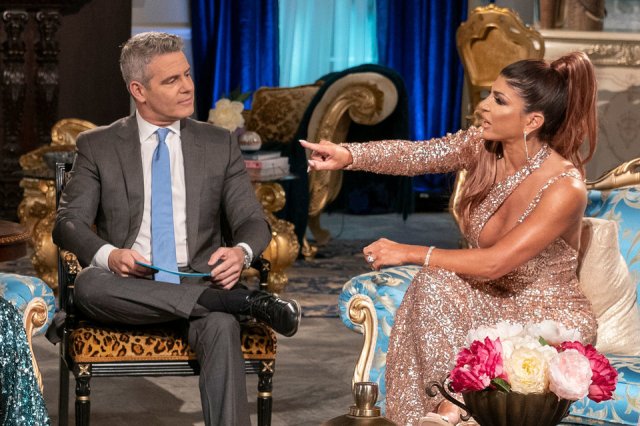What hope is there for a healthy self-image when the body-shaming is coming from inside the house?
If you’re a fan of the Bravo Real Housewives franchise and you’ve ever struggled with your body image, you may have experienced how triggering the shows can be. When the women aren’t flaunting their million-dollar homes and stacked closets—they’re obsessing about their looks. From med-spa visits to deep tans that aren’t found in nature to obsessive body talk, this series is a recipe for disaster for anyone struggling to accept their beautiful selves just the way they are.
This week, Milania Giudice, 17-year-old daughter of Real Housewives of New Jersey star Teresa Giudice, appeared on her mom’s podcast and talked about losing 40 pounds between middle school and high school. She referenced middle school as her “weird era” and compared her physique to “a pumpkin.”
“Do you remember me in middle school?” she asked her mom.
“She was, what would you say? A little bit thicker,” Teresa responded.
“And then one day it hit me, I was like, ‘That’s it,'” Milania said. “I literally felt like suffocating with my own body. I was like, ‘No, no, no, I can’t do this anymore.’ So one day I told my mom to get me a nutritionist and she did, and I ate three meals a day, and they were literally the healthiest meals… I ate it and I woke up before school and I worked out 30 minutes. I woke up like at 5, waiting for school because my school starts early. So I woke up before school. I worked out and then after school, I would work out again. And in two months, I lost 50 pounds.”
That’s a very large amount of weight. In two months. At the age between middle school and high school—so roughly, age 12? 13? Around the same time that weight gain is normal and expected, “as the body stores fat to prepare for the rapid growth and changes associated with puberty,” notes bestcare.org.
At this point in the podcast, Milania remembers her “heaviest” weight before middle school. “My heaviest was 150, and when I was done, I was like 110… I was so skinny after that, I was literally sick I was so skinny, because I worked out. But I felt good. But then I gained it back and now I look like… I don’t know.” At that point, the co-host asks, “So you actually felt something, though? You were like, ‘Yuck… was it like, because you saw yourself on the show?” Reminder: this is an adult woman talking to a 17-year-old child.
Milania replies, “Oh, no. My mom would be like—she’d never say anything to me—she’d be like, ‘Are you gonna have another ice cream?’ and I’d be like, ‘I don’t care if I’m fat. Listen, it’s my life. If I want to have ice cream, I’m going to have another ice cream. When I want to lose weight, I’m going to lose weight. And she knew it. And one day it just clicked. And I did it.”
Passive-aggressive remarks about a child’s ice cream intake do the talking for you—you don’t have to specifically say “don’t eat that” for your message to be heard. And yet here Teresa adds, “They have to want to do it themselves. You can’t force them. I didn’t want her to have a complex or anything. And I thought she looked adorable. She was just a little thicker.”
“My sisters would always throw jabs at me,” Milania explains. “But it was fine.” She went on to add, speaking about what she perceived as her heavier body, “When I was in elementary school, it was cute, but when I got to middle school, it was… not right.”
This conversation, consisting of two adults talking to a child about her weight, is not funny. It’s not light. It’s not cute. It’s not podcast entertainment. “Weight teasing predicts weight gain, binge-eating, and extreme weight control measures,” per data from a 2016 study about eating disorders in adolescents. And “the best-known environmental contributor to the development of eating disorders is the sociocultural idealization of thinness,” research has found.
Which brings us back to the Housewives universe. This isn’t the first time conversations about weight surrounding children have been front-and-center in the series. Yolanda Hadid exhibited infamously problematic behavior toward her daughters, Bella and Gigi, as she repeatedly pressured them to diet to be prepared for their inevitable supermodel futures. “You can have one night of being bad, right,” Yolanda said in one clip from The Real Housewives of Beverly Hills, where she was chiding Gigi for wanting one bite of cake at her birthday party. “Then you gotta get back on your diet, though. Because, you know, in Paris and Milan, they like the girls just a tad on the skinny side.”
It’s all so unacceptable. It’s well-documented that mothers who make frequent comments about weight are “more likely to have daughters who use extreme weight control behaviors.” I struggled with a three-decade-long eating disorder that started when I was 12. Twelve. In Milania Giudice’s case, any doctor would be alarmed by a two-month, 50-pound weight loss, but the two adult women she’s chatting with, one her own mother, are taking it with a grain of salt.
Body-image issues and eating disorders are dangerous. They are predictors of additional mental health struggles like anxiety and depression. And while I don’t in any way think that Teresa Giudice has sent any of these messages intentionally, impact is always greater than intent.
And when the impact is the risk of sending our kids into decades-long struggles with body image, it’s something we really need to think about more.











